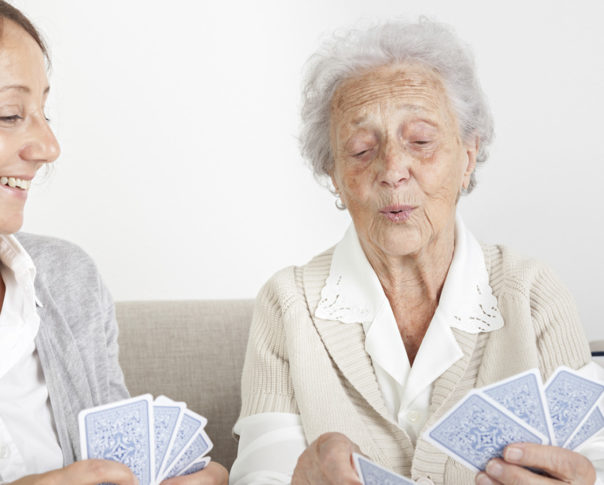Your usually calm loved one suddenly starts shouting and swearing at you. You wake up in the middle of the night to find your father wandering down the street. Your mother suddenly feels confused and has trouble sleeping at night.
It is common to see changes in behavior in a loved one with Alzheimer's. Still, scenarios like these can be deeply upsetting for family members. It is important to remember that these changes, while challenging, are typical as the Alzheimer’s progresses. And while it’s easier said than done, caregivers should try not to take these episodes personally.
Another vital thing to remember is that all behavior is triggered by something. If a loved one with Alzheimer’s has recently become aggressive, this change is occurring for a reason. Perhaps it is loud noises or something else in his or her environment that causes the aggression. Maybe someone said or did something that triggered the behavior. At American, Advocate and Whitsyms In-Home Care, we know that getting to the root of the behavior can help family caregivers manage and potentially avoid many behavioral challenges associated with dementia.
Wandering
A common behavior for people with dementia, wandering poses a number of potential safety hazards. Boredom, medication side effects, or the urge to look for something or someone are often triggers for wandering. If a loved one is wandering, try these tips:
- Help the older adult get regular exercise and participate in enjoyable activities to reduce boredom and restlessness.
- Camouflage doors with removable curtains or use safety covers on door knobs.
- Install an in-home monitoring system that can alert you if a loved one is moving around or attempting to leave the home.
- Have the older adult wear an ID bracelet and/or a GPS tracking device that will help with identification and location tracking if wandering occurs.
- Alert neighbors about a loved one’s propensity for wandering and make sure they know how to contact you if needed.
Sundowning
Sundowning consists of restlessness, disorientation, sleeplessness, and agitation around nighttime. This behavior can be caused by a number of factors, including exhaustion and changes to a person’s biological clock. These steps can help ease sundowning behaviors:
- Discourage inactivity and napping during the day.
- Cut back on sugar, caffeine, and other foods that may contribute to sleeplessness.
- Plan for calm, quiet activities in the afternoon and evening hours.
- Turn on lights before sunset and close curtains. This can eliminate shadows and help reduce confusion.
- Consider talking to the older adult’s doctor about medication side effects if you feel that may be an issue.
Agitation
Agitation can be a particularly troubling behavior to witness in a loved one with Alzheimer’s. This can include irritability and verbal and physical aggression. Agitation may be triggered by environmental factors such as loud noises or clutter, fear, and fatigue. It can also be the result of the person feeling as though they are losing control of their own lives. These tips can help:
- Reduce noise and clutter in the home.
- Follow routines as much as possible and keep commonly used household objects and furniture in the same place.
- Allow the person to do as much as he can for himself to support a sense of independence.
- Play soothing music, read, or take a walk to soothe agitation.
- Do not confront or argue with a person experiencing agitation. Instead, distract him or her with a calming activity.
Alzheimer’s disease gradually changes loved ones in a number of different ways, and everyone experiences the disease differently. If you have a loved one with dementia who is exhibiting challenging behavioral changes, remember, you are not alone.
The referred care providers at American, Advocate, and Whitsyms In-Home Care are always on hand to help reduce restlessness or boredom, and they are highly skilled at creating calming environments that allow older adults with Alzheimer’s to feel relaxed and peaceful. For family caregivers overwhelmed by new behaviors and caregiving duties, our referred caregivers also provide respite care services to ensure you get a chance to rest and recharge yourself.
Contact us today at the location nearest you and let us help find the perfect care provider to meet your needs.
- American In-Home Care – Serving North, Central, and West Coast of Florida
- Advocate In-Home Care – Serving Southeast and Southwest Florida
- Whitsyms In-Home Care – Serving Southeast and Southwest Florida
State of Florida License and Registration Numbers: 30211518, 30211651, 30211295, 30211390, 30210978, 30211293, 30211382, 30211504, 30211733, 30211535, 30211531, 30211710, 30211709, 30211045, 5661



 With over 5 million Americans living with
With over 5 million Americans living with 